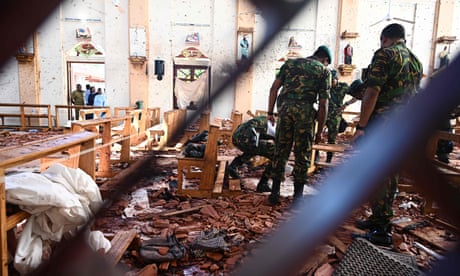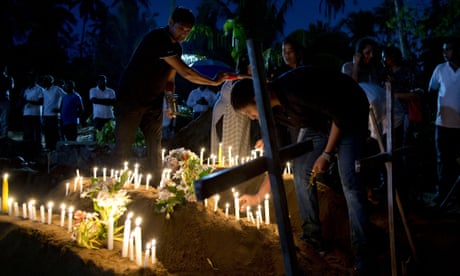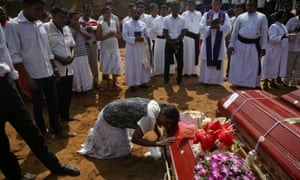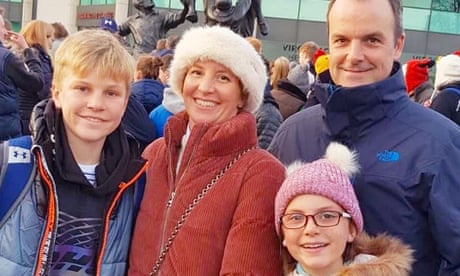{UAH} Sri Lanka bombings were in retaliation for New Zealand attacks, minister says
Sri Lanka bombings were in retaliation for New Zealand attacks, minister says
Defence minister says bombings were in response to mass shooting of Muslims in Christchurch
The Easter bombings in Sri Lanka that killed more than 300 people were a response to the recent mass shooting in Christchurch, New Zealand, the defence minister, Ruwan Wijewardene, has said.
"The preliminary investigations have revealed that what happened in Sri Lanka was in retaliation for the attack against Muslims in Christchurch," Wijewardene told a special sitting of parliament, referring to the terrorist attack in March in which 50 people were killed. The minister did not present any evidence for his claim.
An intelligence memo circulated to some in government in the weeks before the attack noted that one member of the terrorist group named as the perpetrator had started to update his social media accounts "with extremist content" after the New Zealand shootings.
But terrorism researchers have said the sophisticated nature of the attack and the equipment used would probably have required months of preparation, including conditioning the suicide bombers and testing the explosives.
Wijewardene also told parliament on Tuesday that the death toll had climbed to 321 people – including 38 foreigners – and reiterated that the prime minister and other key officials were never told about the possibility of an impending attack.
Sri Lankans have started to bury the dead from the string of bombings.Tuesday has been declared a national day of mourning and white flags were hung from buildings across Colombo as a three-minute silence was held from 8.30am, about the time of the first of Sunday's bombings that targeted three churches and three luxury hotels.
At St Sebastian's church in Negombo, where at least 110 people are thought to have been killed, more than 20 coffins were brought in for individual services in the run-up to a mass memorial beginning mid-morning. "There are so many bodies that we can't accommodate them all at once," Anthony Jayakody, the auxiliary bishop of Colombo, told Agence France-Presse.
A few hundred metres away, a palm-lined lot donated to the church had been turned into a mass burial site, where 22 bodies were laid out by 1pm local time. They were marked out by flower arrangements and numbered wooden crosses. "They have died in one place and our hierarchy has decided to bury them in one place," said Father Sanjeev Senananya, standing by the site.
The small, majority-Catholic city was awash with clerics and mourners dressed in white, who walked past rows of leaflets pasted on the walls commemorating victims. The narrow lanes that criss-crossed the area were watched by security forces in camouflage uniforms carrying rifles. "Every second house is having a funeral today," said a local schoolteacher who gave his name as Amantha.
Flags were lowered to half-mast on government buildings, and people bowed their heads but tensions remained high. Bomb disposal squads were called to Kollupitiya railway station in Colombo after an unattended package was found on a train. The US embassy urged people to stay away from the area before the all-clear was given.
A state of emergency has been introduced and 40 arrests made, with the second overnight curfew lifting at 4am.
Investigators were hunting for clues on whether a local Islamist group named as the chief suspect in the attacks – National Thowheeth Jama'ath – received "international support", said the cabinet minister and government spokesman Rajitha Senaratne.
National Thowheeth Jama'ath is a newly formed group in Sri Lankacommitted to a militant and intolerant Islamist ideology. But though it is known for being virulently anti-Buddhist and has been linked to the vandalisation of Buddhist statues, it has not previously been linked to terrorism. Four of its members were arrested in January.
People gather at a mass burial of victims at a cemetery near St Sebastian church in Negombo, Sri Lanka. Photograph: Athit Perawongmetha/ReutersExperts say it is unlikely the organisation would have been able to rapidly develop the capability to perpetrate a complex attack involving multiple suicide bombings without very significant outside assistance. Senaratne himself said it was not possible for such "a small organisation" to carry out such well-coordinated suicide strikes.
As security forces continued combing Colombo for any more explosives, focus was shifting to the role that infighting within the government may have played in allowing Sunday's attacks to occur.
An intelligence note detailing the names, targets and whereabouts of possible attackers was circulated in parts of the government but is understood not to have reached the cabinet nor the prime minister. It is unclear whether the country's security council also considered the warnings.
Sri Lanka's government has been divided into factions since a constitutional crisis late last year, when the prime minister and his allies stopped being invited to meetings of the country's top security officials.
On Tuesday at St Anthony's Shrine in Colombo – where scores died as they gathered for Easter prayers – a crowd of a few dozen people held candles and prayed silently, palms pressed together.
Some struggled to hold back tears and as the three minutes' silence drew to a close, the crowd began to chant prayers.
The attacks were the worst against the country's small Christian minority, who make up 7% of its population of 21 million. It is the worst atrocity since Sri Lanka's civil war ended a decade ago.
President Maithripala Sirisena's office said there was intelligence that "international terror groups" were "behind local terrorists" and that he would seek foreign help to investigate.
The state of emergency, which gave police and the military special powers to counter militant strikes, came into force at midnight. Suspects can be detained without a court order.
Tensions remained high and security heavy after a bomb discovered by police on Monday near one of the targeted churches blew up before police could defuse it. Although there was a powerful blast, no injuries were reported.
Police also found 87 bomb detonators at a Colombo bus station.
Details have begun to emerge about some of the foreigners killed in the blasts. The US reported at least four Americans killed – including a child – and the Netherlands raised its death toll to three.
The Danish billionaire behind the Asos fashion website lost three of his children in the attacks, a spokesman for his company said.
Eight Britons, eight Indians, two Australians and nationals from Turkey, France, Japan and Portugal were also killed, according to Sri Lankan officials and foreign governments. However, the vast majority of the dead are thought to have been Sri Lankan.
The suicide bombers hit three Colombo luxury hotels popular with foreign tourists – the Cinnamon Grand, the Shangri-La and the Kingsbury – and three churches: two in the Colombo region and one in the eastern city of Batticaloa.
Two additional blasts were triggered as security forces carried out raids searching for suspects.
Interpol said it was deploying investigators and specialists to Sri Lanka, and the US state department warned of possible further attacks in a travel advisory.
Ethnic and religious violence has plagued Sri Lanka for decades, with a 26-year conflict with Tamil rebels followed by an upswing in recent years in clashes between the Buddhist majority and Muslims.
Agence France-Presse contributed to this report
Disclaimer:Everyone posting to this Forum bears the sole responsibility for any legal consequences of his or her postings, and hence statements and facts must be presented responsibly. Your continued membership signifies that you agree to this disclaimer and pledge to abide by our Rules and Guidelines.To unsubscribe from this group, send email to: ugandans-at-heart+unsubscribe@googlegroups.com










0 comments:
Post a Comment